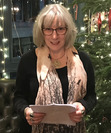Paula R.C. Readman's Blog, page 44
May 16, 2021
Day 13: More Words Of Wisdom from Mr C

To dream a dream is to live between two worlds. For me, I was in a hurry to learn what I needed to know, so I could focus on the writing. I wasn’t getting any younger as I was heading towards another milestone in my life. My frustration was not knowing whether I had the right amount of knowledge, as far as grammar went, to carry on without completing the course.
I reasoned that the college would not have employed teachers who weren’t qualified, would they? I was in limbo over whether it was worth carrying on, and hoped at some point things would get better. I had always believed knowledge can be found in the most unexpected places. The old saying about Learning something new everyday was true, even if it is something new about yourself. I wondered whether I had enough courage to complain.
As far as Mr C went, I discovered his teaching skills were like putting a jigsaw puzzle together without a picture and not even being sure you had all the right pieces. Was I really learning enough from his erratic teaching to be able to slot the piece together for myself?
All I could do was hope at some point it would all make perfect sense to me.
 Photo by Sharon Snider on Pexels.com
Photo by Sharon Snider on Pexels.comDay 13 Back to College From my time as a mature student. A new year 2007
After the heavy snow two weeks ago, and half-term school break, I was looking forward to returning to my evening class.
Why? You might well ask…
Well, to start with I thought I might learn something useful to help me improve my writing. But thanks to good old Mr C, all I can say is one has to question the logic behind the college’s reason for employing him. Please can someone tell me how did that man become a teacher?
He was back to his old tricks again. Once again to his class of three, he read out a worksheet he had printed off the internet about ‘Present Perfect’.
It made no sense to any of us, especially with his added waffle. In the end, I asked him to explain to us how it worked and which words were the verbs etc. After he hunted for a pen, he wrote down this down on the board:
1st PS: I have you have
3rd He, She, It/ has
We have
you have
They have
Verbs: have been saw seen forgive forgiven.
Yes, I know… dear readers, you might understand it, but it made no sense to us. To learn, you need to understand and Mr C didn’t seem to understanding that his style of teaching was leaving his students very confused that we had no understanding of what he was teaching.
Here are some more of Mr C examples:
An Uncompleted Action You are Expecting: We often use the Present Perfect to say that an action which we expected has not happened. Using the Present Perfect suggests that we are still waiting for the action.
James has not finished his homework (yet)
Mr C said we didn’t need the word yet because we knew that James would finish his homework at some time.
I said, ‘ It made more sense by adding the word Yet as that was the word which told you he would finish it at some time.
Susan hasn’t mastered Japanese, but she can communicate.
Again, Mr C said this sentence told us that sometime in the future Susan would master Japanese.
To me, the sentence told me ‘Susan hasn’t mastered Japanese, but she was able to communicate in whatever way she could so maybe she didn’t need to learn Japanese after all.
Bill has still not arrived.
Mr C said, “If we took out ‘still’ we would know that Bill will arrived at some time.”
I wasn’t convinced as still told us there was a good chance Bill would arrive at some point come. If you remove still everyone would assume he wasn’t coming.
Next week, Mr C will be showing us how to write poetry. I can’t wait…
Right, now down to some real studying… I’ll just do some more of my ‘Collins Cobuild intermediate English Grammar’ exercises form the book I bought as this is far more helpful to me.
May 15, 2021
Day 12: Don’t Write Too Much! says Mr C
 Photo by Ylanite Koppens on Pexels.comThere are nettles everywhere: But smooth, green grasses are more common still: The blue of heaven is larger than the cloudby E.B. Browning born: 6th March 1806 died: 29 June 1861 an English poet
Photo by Ylanite Koppens on Pexels.comThere are nettles everywhere: But smooth, green grasses are more common still: The blue of heaven is larger than the cloudby E.B. Browning born: 6th March 1806 died: 29 June 1861 an English poetDay 12: My time as a mature student in 2006
I have been very busy since my last Bush up on English Class at the College. There were only four of us for the last class before we broke up for the Christmas break, so I hope things improve in the New Year.
While out shopping I bumped in to Motorbike Dave, he said he enjoyed the classes and really wanted to get ahead in his writing. I told him I was worried the class might be cancelled if numbers of students fell too far. He said he would be coming to every class. I was pleased to hear it; at least, I know there will be two of us.
The classroom’s ongoing story, which I call ‘The Room’; Mr C had forgotten to bring in the next part, but he had brought in my part 3. When he gave it to me he said I wrote like ‘Mills & Boons’.
I wasn’t sure what he meant by it so I purchased three Mills & Boons books over the Christmas break. I was confused as the books were far raunchier than my writing, but as the authors of such books were published I took his comment as a compliment.
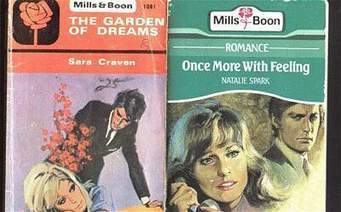 from Google Mills & Boons Books
from Google Mills & Boons Books Mr C kept asking me what happens next in my story, and who was George etc, I laughed and said my writing must be good, if he wanted to know what happens next. So all I must do now is write part five before the class starts on the 4th Jan.
Mr C’s last comment to me before we left the class was “Don’t write too much over the Christmas break.
“Who me…? Never…!”
Well, ok, so I’ve been a bit busy writing, but I don’t think two short stories and one non-fiction article is much, do you?
I’m now rereading my children’s book before sending it out again. I want to start this New Year with as much out there in the big wide publishing world as possible.
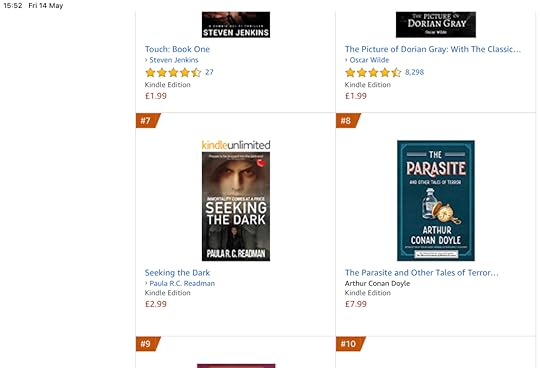
Book News: Yesterday, I found that my novel Seeking the Dark on Amazon British Horror Fiction had made it to number 7 in their new horror releases before slowly sliding down 9. It’s made it to New Releases in Horror Suspense #12 and Contemporary Urban Fiction #16. I did hope it might hit number One for at least an hour, but never mind. I have my first review which is great. So please do check it out, thank you.
I’ve emailed my local bookshop to see if I can supply them with my both my novels, Stone Angels and Seeking The Dark. So I have my fingers crossed. My Granny Wenlock is slowly taking shape but my mind has been on Seeking the Dark.
I did a radio interview the other night, but it wasn’t brilliant. The presenters were all over the place and they were having problems. I wasn’t sure what to expect as it was an online show. They’ve invited me back, so next time I will be more prepared. I have a couple of other things line up, but I will tell you about them later.
Have a great weekend.
May 13, 2021
From a Short Story to a New Release, Seeking the Dark.
If you have been following my Mr C series you will know that I joined a local college in hope to understand how English grammar worked. The picture above shows my first attempt at writing a short story back in 2004 before the college course, Brush Up on your English. At that point in time all that I knew about how to write was from what I had learnt from reading ‘how to‘ books.
The Girl On The Bus story I took into work and showed it to my work colleague and friend, Lisa. My heart raced as I watched her face closely to see her reaction. Would she laugh at my effort? When at last she looked up to my surprise she said, “I want to know more about the character.”
This led me to write a 129K word novel called ‘We the Ancient Ones’.
I had no idea how to write a novel when I started it. Questions raced around my head. When did you know a chapter was finished? How did you write a sentence? The list was endless.
This was the reason I attended the college course and was so focused on learning. I found it very frustrating never being sure whether what I was writing was the correct way. Of course in those early days I did submit and unsurprisingly it was rejected, but I did receive some positive feedback too. Comments like there’s a story here, but it’s too wordy. It has atmosphere but needs editing.
I never gave up and stay focused no matter what happened.
I dropped the title ‘We The Ancient Ones’ and for a while it became the ‘Seventh Commandment.’ I tried submitting again. The ‘Seventh Commandment’ was dropped as I felt it was too religious, and went for the ‘Souls of Angels as this was more in keep with a fantasy-type novel. Then one day while listening to Noel Edmonds talking on a radio show, and he said the line, “It was like seeking in the dark.”
I have no recollection of what he was talking about, but I knew I had found my title. Seeking the Dark. After years of editing and rejections I set the novel to one side and moved on. After writing three more novels, I finally found a home for one of them when Stone Angels was published.
While working on Stone Angels I learnt how to be brave and to take a red pen to things that really don’t move the story on. Once the novel was published I went back to Seeking the Dark and set to work deleting and rewriting, making the story much stronger and darker. Also I focused on just what the main plot line was and who was best to tell the story.
 The Final Cut Can Be Yours If You Click On This Link
The Final Cut Can Be Yours If You Click On This LinkToday you get the change to read Seeking the Dark for yourself and it is now live. Yes, my journey to this point has been a long one but it has only just began. The run is far from over, and I still do have ambitions with my writing. I hope I will continue to grow as a writer and tell stronger and more powerful stories in the future.
Seeking the Dark is now available on Amazon, so please do check it out.
Here’s the book trailer and the link to Amazon wherever you are in the world: https://mybook.to/seekingthedark
May 12, 2021
An Early Morning Walk & Book News
My heel has finally healed enough to be able to go back walking. Today we walked through Rivenhall Thicks and around back onto the John Ray footpath. The walk wasn’t a long one just 88 minutes in total just to see how my heel would cope, and whether my new boots are making my feet happy at last. Now the warmer weather there is more to see. A pretty butterfly danced along the hedgerow in front of us begging for our attention.
Painted Lady: Migrates to Britain from south-west Europe and North Africa each May and June. This butterfly is a powerful flyer and travels move than 600 miles (1,000km) to arrive here. Our winter aren’t suitable for their survival in any stages of their lives whether as an eg, caterpillar or chrysalis. During their summer here they will create a second generation of butterflies by lay eggs on a wide range of British wild flowers.
[image error] Yellow HammerYellow Hammer: This handsome bird is well-known for its wonderful song, a-little-bit-of-bread-and-no-cheese. It does require a little imagination on our part. They love open spaces with low cover and a few trees because they are ground feeders and nest low down, concealing it by overhanging plants. Occasionally they will nest a few feet up in a thick bush.
[image error] Blue TitBlue Tit: This bird is a woodland creature though it is well-known visitor to British gardens. It nests in holes in trees which is why they will move into nest-boxes in gardens.
For other news:
[image error] Seeking The DarkTomorrow is the launch of my second gothic crime novel, Seeking the Dark. When I wrote this novel years ago and suffered a few rejections on it, I set it to one side never believing it would ever be published. I’m not saying I gave up on it, but vampire books were no longer in vogue at that time.
I went on to try my hand at writing other books, many of these sit at various stages on my computer. Now that Stone Angels had been quite successful I feel rather positive about Seeking the Dark.
Here’s a short book trailer ad I made:
Seeking the Dark is available from Amazon https://mybook.to/seekingthedark
May 11, 2021
Mr C Is In His Element
 Photo by Wendy van Zyl on Pexels.com
Photo by Wendy van Zyl on Pexels.comWhen writing I think it is very important to be well read. By this I mean not just in your chosen genre, in which you’re writing but across the board. Try reading outside what you would normally select. I’ve always read a wide range of genres because I tend to be interested in the storyline first, when I pick up a book to read. By doing so you also get to know the difference between what works for you and what doesn’t in the many different styles of writing.
If the plot line is interesting enough I will read the opening paragraph to see if it grabs me. I’m afraid if I don’t get drawn into the action straightway, or it’s too repetitive with too much information dumping I lose interest quick. I love book where the characters sweep you along with them. Books like The Five People You Meet in Heaven by Mitch Albom The Bridges Of Madison County by Robert James Waller The Forgotten Garden by Kate Morton and Jonathan Strange & Mr Norrell by Susanna Clarke are among my top favourite books of all time. They are all very different in writing styles and plotline. They are unique books.
Of course I have read lots of books by the same authors i.e. Stephen Kings, Ian Rankin, Sophie Hannah, Sue Grafton, Janet Evanovich and Patricia Cornwell etc. The list is endless. I adore Victorian ghost stories too.
Yes, you are right, dear reader I missed out day 10 of my evening class yesterday so here it is.
Mr C seemed a different person when he introduced his class to different styles of writing in day 10 of 32 Brush Up On English.
 Photo by Element5 Digital on Pexels.com
Photo by Element5 Digital on Pexels.comDay 10 of 32: Mr. C in his element
Do I have some exciting news for you this week?
Mr C excelled himself.
I really enjoyed the lesson. Only five students arrived this week, plus two classroom assistants. Mr C started by going back over paragraphs, telling us what they were, and how to write one. He had copied two short paragraphs out of a newspaper and told us we must keep things simple.
The first line of the paragraph should mirror the last line, he told us.
Then he went on to talk about how to gather together information to write an article, letter, book etc. He did it by drawing a diagram. In the centre, he put the main subject, and leading off like a spider’s web was interlinking ideas.
“Wasn’t it a bit like brainstorming?” I asked,
I supposed, it is,” he said.
We then had to choose one of 10 subjects to write a short paragraph about. After the smoke break, Mr C gave us a sheet of paper with three examples of different descriptions. One paragraph was by Dean Koontz, one by Ian Rankin and another by Charles Dickens. Mr C seemed to want to take his time talking us through this lesson. I had the feeling he found this sort of lesson far more enjoyable to teach.
He has given us part three of our on-going short story. I was both wrong and surprised to find that other students in my class have been working on their stories.
Mr C took my part two of my story away to read properly. He said he hadn’t brought my short story for the local newspaper competition back yet as he was still reading it but would return it next week.
He did make some comments in the class to me about my second part of my story ‘The Room.’
(Dear Reader I apologies but I didn’t recorded what he said)
More tomorrow.
May 10, 2021
Tearoom Guest’s Chat: Zach Lamb
Welcome to Clubhouse Chat page. Those of you who are not a member won’t be aware that the location of the Clubhouse is shrouded in mystery. The only way to visit it is via membership or an invite to the tearoom. Every few days, I’ll be sharing a conversation with all sorts of writers and authors at different levels of their writing careers. Over tea and cakes, or maybe a glass of something stronger, I shall be chatting with my guest about their work in progress, or latest book release.

Today I’m welcoming, Zach Lamb to the tearoom, Welcome, Zach and as always my first question is what drink would you like while we chat?
Thank you for the invite into your secret lair, Paula. If you happen to have a spiced chai among your teas and potions, that would be great.
Now we have our drinks lets start by asking you when you first begun your writing journey, what drew you to your chosen genre?
I’ve always read from a wide variety of genres from classic literature to horror, so I have a lot of influences. When I had the idea for my first novel, The Suicide Killer, I was reading a lot of true crime and thrillers about serial killers, so it was a natural progression from there. I have a novel coming out on May 17th called Dark Water Sacrifice, and it’s a paranormal horror story. So I don’t set out to write one particular genre over another. However, no matter what kind of story I write, it’s always going to be dark fiction. And I don’t think that’s a choice. It just seems to be the way my brain is wired.
Tell us a little about latest writing project. Is it a new idea, or one you have been mulling over for some time?
As I just mentioned, I have a new novel coming out the elevator pitch is: When horror writer Adam Blackwell’s daughter drowns, he flees his small town in Georgia vowing never to return. Two years later, his father’s suicide brings him home to settle the estate and face the relationships he abandoned. An unseen force bent on destroying Adam and all he loves has called him home and haunted visions of his father and daughter force him to confront his role in her death. Other than that, I am also working on the sequel to The Suicide Killer. I’m currently calling that Mourning Glory. It’s a relatively new idea. When I wrote the first book, I hadn’t ever planned on writing a sequel, but one day I had an idea, so I started on it when another book I was writing kind of fizzled.
How many unfinished projects do you have on your computer?
I have a number of ideas for novels and short stories that all have various amounts of notes written for them, but I only have the one I just mentioned that has been started and not finished. I haven’t abandoned the idea. I quite like where the story was going when I started it, but to say the last year has been disruptive would be an understatement. All of my fiction is dark, but I felt like it was shaping up to be the darkest thing I’ve ever written, and I just wasn’t in the right headspace for it at the time. One day I was writing and hit a dark wall that I didn’t have the strength to push through at that moment. I even stopped writing in the middle of a word in a sentence. I’ll eventually finish it. Not sure if it will be the next novel, though.
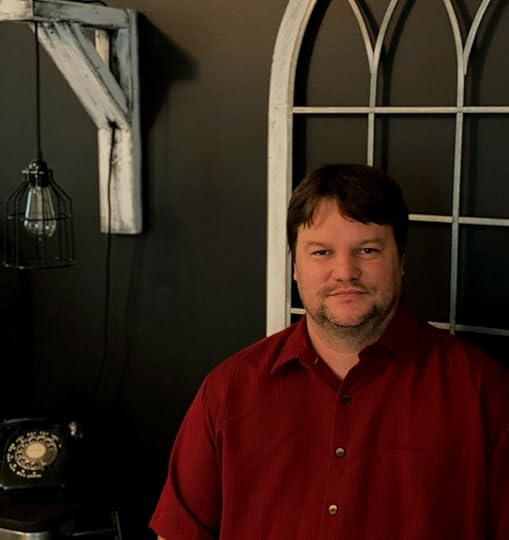 Zach Lamb
Zach LambDo you write a synopsis first or write the first chapter?
I like to say I’m a plotting pantser. I don’t set out to plot any story I write, but I inevitably end up plotting portions of it at some point. When I have my initial idea for the story, I sit down to write and see where it goes. The problem is I’m a linear writer, but not a linear thinker. I write the story in order, but while I’m writing other ideas for future events pop into my head. Or when I’m not writing, but doing something else, an idea will hit me for the story. When I write, I always have two word documents open. One is for the draft and the other is for notes or ideas that I know I’m going to have. I keep the notes open and use them as I get there. Sometimes it will be small passages that I need to flesh out or the occasional cryptic message that I have to decipher. It’s rare that a full scene will develop in my notes, but that has happened as well. As far as a synopsis goes, I’d rather never write one of those again. They are my least favorite thing about being a writer.
When reading your work through, do you ever find that your daily mood swings are reflected in your writing?
Definitely. And I can feel it while I’m writing it too. There have been a couple of times where the mood I was in clashed with what I was writing, and I had to step away.
Were any of your characters inspired by real people?
Kind of, I guess. Most of their traits, mannerisms and other characteristics have come from people I know and from people I have observed around me. They’re all an amalgamation of different things I have observed. Something might seem familiar to a reader, but I haven’t based an entire character on any one person.
What did you learn when writing your book? In writing it, how much research did you do?
I learned I had the nerve to write a novel. It sounds easy when you say it out loud, but to do it for real is completely different. I learned a number of other personal things about myself. I live in Georgia. For all my friends across the pond, that’s in the U.S. south. There are so many negative stereotypes about people from the south and I used to feed into that. I hated it and every negative connotation that went along with it. So far, all of my stories have taken place in Georgia and through writing, I have learned to look for beauty in negative spaces. I still have a lot of issues with things that go on here, and those stereotypes are there for reasons, but I have found an appreciation for the good things that I never paid attention to before. As far as research goes, I haven’t had to do too much research for either one of the novels I’ve written. There were some questions I had about police procedure and law enforcement that I needed answered, but I was lucky enough to have a friend in the Sheriff’s Department to answer those, so that was as easy as a phone call or late night text.
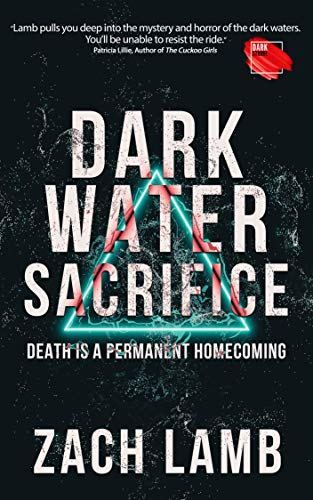
Did you ever consider writing under a pseudonym?
Never. I always say my ego is far too big to let anybody else take the credit for my work. I’m sure there are writers out there who have deeply personal reasons for using a pseudonym, but I don’t really see the point. I know some do it when they’re writing different genres than their usual fan base is accustomed to and I read an interview where Stephen King said he used one because his publisher said readers wouldn’t buy more than one book a year from a single writer. None of that is really how the industry works anymore. Now you see books that have the author’s name writing as the pseudonym on the cover of the book, and that makes even less sense. So unless you have a reason to hide your identity, I don’t see the point.
How do you select the names of your characters? Do you know everything about them before you start writing their story?
Sometimes I use a name that I like or I’ve heard recently and I like the way it sounds. The protagonist’s name from Dark Water Sacrifice is Adam Blackwell. I had no idea what to name him or his brother in the book, so I used the first names of two friends I had when I was younger. I got Blackwell from the side of a construction company’s truck. I liked how it sounded and if you read the story, you will see how it fits symbolically. I didn’t plan that. I ended up changing the brother’s name toward the end because I didn’t want it to look like I was using my friends as characters, but I kept Adam. I’d lived with his character for too long to know him by any other name. I also have a short story with a character named Shad, which is a type of fish, so really I get them from everywhere.
What was your hardest scene to write?
As a writer, there’s always going to be scenes that you take a breather from no matter what genre you are writing. It doesn’t matter if that scene has dragon or ghost or any unnatural being in it. If the interactions are true to life, it’s going to happen. That being said, the hardest scene I’ve written is in Dark Water Sacrifice. Adam is back home at his father’s funeral and has a flashback to the day he had to give the eulogy at his daughter’s funeral. That scene wreaked me. I have a younger daughter and it hit too close to home. I had a couple of tall glasses of scotch the night after I wrote that one. It’s still a gut punch to me every time, and I’ve had to read it numerous times. I hope that comes out in the scene when people read it. It’s hard for me to tell because it’s such a deeply personal scene for me and I can remove myself from it or how it makes me feel.
Thank you for joining me, If you would like to find out more, Zach’s books and writing please click on the links below:
Website – zachlambauthor.com
Twitter – https://twitter.com/Zach_LambAuthor
Facebook – https://www.facebook.com/Zach-Lamb-Author-102039438275213
Dark Water Sacrifice – https://www.amazon.com/Dark-Water-Sacrifice-Zach-Lamb/dp/B091GSCQR2/ref=tmm_pap_swatch_0?_encoding=UTF8&qid=&sr=
The Suicide Killer – https://www.amazon.com/Suicide-Killer-Zach-Lamb/dp/B08HGRWCT1/ref=tmm_pap_swatch_0?_encoding=UTF8&qid=&sr=
If you want to find out more about Clubhouse Members’ Books, don’t forget to check out the Clubhouse Bookshops too.
We talked and Mr C listened
 Photo by Leah Kelley on Pexels.com
Photo by Leah Kelley on Pexels.comXmas is one of the most oldest informal usages in the English language. In its old English form it appears in the Anglo-Saxon Chronicles roughly 870 -1154. The X stands for the Greek letter chi which is shape like a X. The first letter of the Greek name for Christ is Khristos = Christ, the Anointed.
When writing the word, Christmas it is best to write it out in full, rather than the informal Xmas, according to my copy of The Right Word at the Right Time, by Reader’s Digest.
And why am I mentioning Christmas now. Well, in my series about Mr C it’s December 2006 and we are one lesson away from Christmas.
Day 11: We talked and Mr C listened.
Sorry, dear reader, I know I’m a bit late updating you on my classes.
Like you I have be busy getting my home ready for the celebration with Christmas just around the corner. We are all busy with things to do, and places to go, but I’m never too busy to miss out on my Brush up on English classes.
As I entered the classroom for our lesson, I thought I was going to have Mr C and the classroom assistant all to myself. Mr C said, that we would wait five minutes longer to see who would turn up.
“It’s always the same this time of year, the closer we get to Christmas, the less people come.”
Motorbike Dave arrived followed by the two Portuguese lads. So in total there were four of us. The classroom assistant worked with Motorbike Dave, while the two lads and I worked with Mr C and talked about ‘Discussion.’
Mr C asked us what we thought about ‘Big Brother’. This fell a bit flat as the three of us didn’t like the programme. We discussed the different way in which we talk to certain people i.e. Bank managers, Police, Loved ones etc. The language we use, did we swear? When and to whom.
When the smoke break came Mr C was the only person to leave. The rest of us continued the lesson. The two Portuguese lads and I got on with writing a letter of complaint to a TV company about a programme we disliked. We had to put our reasons over clearly, why we felt the programme should be taken off air.
The lesson was very interesting, and I enjoyed it.
The two lads had both been working on their stories, and asked for part 3. I said I needed part 4.
Mr C said he had only done two parts so far.
“I’m sorry, but I’m up to part 4 now. I could miss lesson so the rest of the class can catch up,” I joked.
“No, don’t do that!” The classroom assistant cried, “Please come along next week.”
So I wondered what will happen tomorrow in the last lesson of the year. Will Christmas prevail and I’ll be the only student?
 Photo by Tirachard Kumtanom on Pexels.com
Photo by Tirachard Kumtanom on Pexels.comHold on in there dear readers the end is coming. 


Yes, Paula, and so is Christmas I hear you say.
May 8, 2021
Some Words have a ‘sell by date’?
 Photo by Suzy Hazelwood on Pexels.com
Photo by Suzy Hazelwood on Pexels.comI love language, learning about the history of words and where they came from. How the words have developed over the years, and when they entered into common usage in our language. I understand that some words go out of style or are no longer relevant in our high-tech modern world. As writers we need to keep up with the ever changing use of words. If you’re an historical writer, it’s important to be aware of when changes occurred to our language, if you want to keep your characters speaking within the right time line you have set them.
In the mid-1950s according to my Reader’s Digest, The Right Word at the Right Time. Professor Alan Ross, a British linguist and sociologist studied the language used in Britain by the Upper Class and the Non-Upper class. He found mark differences in their vocabulary as well as their pronunciation. Here’s a few:
Upper Class: False Teeth Non-Upper Class: Dentures Upper: To have my bath Non-Upper: To take a bath
Upper: Lavatory Non-Upper: Toilet Upper: my wife Non-Upper: the wife Upper: Napkin Non-Upper: Serviette
Upper: Scent Non-Upper: perfume Upper: Rich Non-Upper: wealthy
I found the differences between the two vocabularies quite striking. Reading the article in the book also explained why there was two words for the same things in the British language too.
Take the word Lavatory: Middle English: from late Latin lavatorium ‘place for washing’, from Latin lavare ‘to wash’.
Toilet: The word came from French toilette ‘cloth, wrapper’. In 16th-century English a toilet was originally a cloth for wrapping clothes, then a cloth cover for a dressing table and then the word meant the articles used in dressing. Eventually the word became the process of dressing and washing oneself. In the 19th century, toilet came to denote a dressing room with washing facilities. The modern meaning of ‘lavatory’ arose in the early 20th century.
I hope you enjoy the next instalment of my time as a mature student at a local college in 2006.
Day 9 of 32: ‘Unbeknown’ to me, some words have a sell by date.
At what point do you have to reach before you can say enough is enough?
I wanted to scream, “Call yourself a teacher!”
This week was all about paragraphs. Mr C handed out his usual collection of BBC worksheets to the class of six, plus one classroom assistant for the student who didn’t turn up yet again. Mr C sat down in his chair and raced through the worksheets, reading out bits and pieces with his amazing speed and interjecting comments.
“Well, you don’t need to know that! You need to order your mind! Don’t start every sentence with the same word!” After a few minutes of his interjections, he said “Well, we got through that quite quickly, didn’t we?”
I sat waiting for him to talk about the short story; he had set for the class last week. When he finally got round to asking about them. You can guess what happened. Yeah, Ms Goody Two Shoes here was the only one to have completed her homework. However, two of my fellow students said they hadn’t quite finished theirs. Not that it really mattered as Mr C said nothing more about whether he wanted to see them or not.
The task we were set was to write a 200 to 300 word short story. You needed to set a scene of a woman walking into a room. She stands still for a few moments before crossing to the fireplace. She looks at a picture over the fireplace for a few moments before making a phone call.
 Photo by Jou00e3o Gustavo Rezende on Pexels.com
Photo by Jou00e3o Gustavo Rezende on Pexels.comHere’s my attempt: The Room.
The room was perfect. The woman had spent all morning cleaning until everything gleamed and the sweet smell of polish filled the air. In the marble fireplace, the flames danced to unheard music, casting shadows around the room.
The woman entered. She shivered and went straight to the fire. She picked up the poker and tried to entice the flames to ignite the untouched wood. The firelight highlighted the fine lines around her eyes. The late nights and worry showed like uninvited guests on the once perfect face.
As she straightened, she wiped her face, and left an unbeknown black smudge across her cheek. For a moment, she watched the fire with disinterest, her mind on other things. She looked up at the painting above the fireplace. It stared back at her with arrogance.
“Why, tell me why,” she shouted, shattering the quietness of the room. She closed her eyes, inhaled deeply, and clenched her fists to her breast allowing the anger to subside.
“Where are you when I need you?”
Her body trembled as she picked up a small vase and held it to her breast. In a low whisper she said, “You promised me. It would never happen again.”
She stared at the cat’s-eye coloured vase and studied it before looking up at the painting. He smiled down at her; daring her to. With a defiant look, she stared back at him. On hearing the low trill of a mobile phone, she placed the vase carefully back down and left the room.
 Photo by Pixabay on
Photo by Pixabay on This week Mr C has given us part two of the story to try. We have to introduce a second character, but he told the class they don’t need to do it, if they don’t want to. Therefore, I guess I’ll be the only one who will.
When they all disappeared for a smoke break, I asked the classroom assistant, if she would like to read my short story. I wanted someone to read it as I had taken the trouble to do the homework. I found her far more helpful than Mr C and she even said, I wrote like a real writer. I thanked her. Wow me, a real writer.
The classroom assistant also told me, she was trying to get Mr C to move one of the students out of our class. Motorbike Dave didn’t enjoy reading and was having problems with writing and a hard time learning how to spell. She works in another class, where she was helping another man about the same age as Motorbike Dave, who was having the same problems. She said Dave could help himself a lot more if he took the time to read more often.
Once the class had returned from their break, Mr C spoke to us about spelling. He gave us more or less the same list of words last week. Again, we talked about how to spell certain words. He talked about the fact that certain words like ‘disappoint’ has two ‘p‘s’ in it and it took him until he was 25 years old to be able to spell it correctly. He said “Why does ‘Embarrass’ have two ‘r‘s’ and two ‘s‘s’ in it.
One of the Portuguese lads asked him if you dropped one of the ‘s‘s’ when you spelt the word Embarrassment. Mr C said he didn’t know.
I thought you didn’t, but as my spelling is quite weak, I checked in my dictionary. I told Mr C that you didn’t drop any letters and just added ‘m.e.n.t’
“There you go; you just add ‘ment’ class,” he said sarcastically.
Ms 40’something said she got confused by ‘Th’ as to her it sounded like an ‘F’. The Portuguese lads both nodded in agreement saying they too found the sounds of certain letters confusing too.
I told them in the beginning of my dictionary there was a key to the pronunciations, which explained the different sounds certain letters made in the words.
Mr C said he hadn’t known you could find a key to the pronunciations in dictionaries. I went on to explain to the two lads, if there was a mark that appeared over a letter the stress was then put on that letter.
Dear Reader, if I have made a mistake in giving that advice, then I can’t be doing any worse than our teacher, Mr C.
Two other things Mr C told us this week. That he once worked as a reporter on a newspaper and enjoyed working there, though the newspaper now no longer exists. Two, he had a lady in his class who couldn’t write a word when she first came, by the end of the course, she could write three pages.
I did wonder if she was so exasperated by the quality of the lessons, she wrote a three page letter of complaint to the college.
When Mr C finally looked at the short story I wrote for his class he said he thought the word ‘Unbeknown’ was an old-fashioned word and I shouldn’t use it. He also commented on my short story I had written for a competition in my local newspaper, which he had asked to see, without even reading it through completely. I told him I felt he couldn’t really comment on it until he had read it first.
Dear Reader, I also asked him if he felt I was unsuitable for the class as motorbike Dave was at one end of the spectrum while I was at the other end. While the rest of the class was in the middle somewhere. I felt it was unfair on me to expect him to spend any time with me when the rest of the class needed his help.
“Well, I feel you could still learn a lot from my class,” he said, “and I could set you up different pieces of work to do in the classroom.”
Oh great, this is just what happened to me at school I was left working from books. I wanted to be able to put up my hand and say could you explain that again to me. To me there is nothing quite like talking to someone who wants to get the best out of you. Who wants to teach you and to know you fully understand what they are teaching you.
And this is nothing like it.
May 7, 2021
No Sign of Light
 Photo by Anna Tarazevich on Pexels.com
Photo by Anna Tarazevich on Pexels.comWhen setting out on any journey it’s good to have some sort of goal in mind. Back in 2006 my goal was a simple one. I wanted to be a writer. I had some success already by having a several of nonfiction articles published and to my surprise I had even been paid for them. After spent over twenty-five years researching my family history, I had uncovered a few interesting family stories, plus I grew up in an unusual place. How many people can write about growing up at a watermill.


Soon my nonfiction articles were being rejected. This put me off writing them so decided to write a novel. That’s when I learnt that writing fiction was different to nonfiction. You had to draw your reader into the action, and hold their attention. The ‘How to’ books I had read told me I had a lot to learn but my main concern was not fully understanding how English grammar worked. Working full time in a low paying job meant I had neither the money nor free time and I had a young son to support. I had check out mainstream writing courses at the local college, both evening and daytime ones, but these were expensive. Most information on writing, to be published, I could gain from books, but grammar I found hard to understand. it was like learning a foreign language and went completely over my head. So Brushing up on English Basic Skill seemed like a great idea. So I thought 
Day 8 of 32: No Sign of Light on the Horizon.
The weather has changed, bringing with it wind and rain. The path to the college was covered with brightly coloured fallen leaves. I was the first to arrive closely followed by Mr C, who cheerfully told me, he’d been very busy sorting out his office.
I asked him when we entered the classroom if he had our folders. He smiled brightly. “Yes, they are in the filing cabinet over there.”
For the first time as each of the students arrived, they were able to have their folder at the beginning of the class. In each of the folders was a form we should have been filling in at the end of each lesson to say what we had learnt, and what we thought of the lesson but because Mr C was so disorganised we haven’t been filling them in.
 Photo by Brett Jordan on Pexels.com
Photo by Brett Jordan on Pexels.comThis week, there was Mr C plus two classroom assistants and eight students. I asked if he had brought back the rest of my synopsis, he had been looking at it for me. He said he knew I was going to ask about it, so he had. Now two weeks ago, he told me he had been through it, and had corrected it for me. Therefore, I was a little surprise when he gave it back to me while the rest of the class was busy working, unmarked. He then sat with me and quickly went through it. I asked him if he could tell me where my weaknesses were in my writing. He erred for a second. I thought he might not have understood what I had said, and asked him if it was my tenses. He smiled and said yes, but he could sort that. I then asked if we would be covering the tenses in future lessons. “We will be covering everything,” he said. I told him I wanted to learn more about grammar.
I should have told you, dear readers, Thursday night’s lesson was about the use of the Hyphen. This in itself was interesting, but when Mr C said brightly, he was please to tell us that this was the last lesson in which he would be covering grammar and made a gesture of drawing a blade across his throat.
I was shocked.
Most of the books I had read showed me we had only dip our toes into the Grammar Ocean. Most of the class had no understanding of verbs or adjectives, I knew. Ms Giggles had brought it up in at least three lessons that she didn’t fully understand. Ms 40 something had said she would like to go back over all the lessons again, because she still wasn’t sure she fully understood either.
He gave seven of us a worksheet. There were four questions with four different examples of the same question with hyphened words in. Each was a short paragraph, which talked about genetic engineering, and cloning. Each had a slightly different set of words hyphened.
For question one, six of them were working in pairs on solving it. I worked alone as I was sitting on my own (It was just how the class seated themselves when they came in.) Motorbike Dave was working with one of the classroom assistants.
I asked Mr C a question about the first question on the worksheet. When he came over, he smiled, and said it was good that I was thinking. That didn’t really answer my question, so I carried on with the next one on the sheet. When he came back, he went through my answers and told me, I had them all right.
Ms Giggles asked a question about one of the questions on the sheet. She wanted to know what was meant by ‘A real-world situation?’ She asked him to explain it to her, as she didn’t fully understand the context in which it was written. Mr C just read the question out to her. Ms Giggles shook her head. “I don’t understand what a real-world situation means in the context in which it has been given. I don’t even understand what the paragraph is talking about anyway.” She then just gave up as Mr C ignored her and went on to talk about the next worksheet he wanted us to work on.
My heart went out to her when I saw the look of defeat on her face. I wanted to cross the room and explain it to her, but I didn’t as there was a classroom assistant sitting with her.
The next sheet I got completely wrong. He wanted us to make the words into adjectives, the first one he did for us.
Nature – Natural Finance: Biology – Culture – Universe – Industry – Ecology-
Environment- Geography etc.
I told Mr C that I wasn’t sure if I was doing the exercise correctly. He seemed puzzled. I said I felt it would’ve been better if he had used different words. He laughed and said that would’ve been far too easy. I explained that I understood what the words meant; I just didn’t understand what it was he wanted us to do with them. Ms Giggles told him she had no idea what some of the words even meant in the first place.
For homework, Mr C wanted us to write a short story of about 200 to 300 words long or longer if we wanted to. We had to set the scene and to imagine a woman walking into a room. She stands still for a few moments and then walks over to the fireplace. She looks at a picture over the fireplace for a few moments before walking over to the telephone and dials a number.
We had to fill in the details and give the piece a mood. Is it sad, is it dangerous, a mystery or a ghost story. He doesn’t want us to tell him but to show him. He told us to think of a colour, think of an occasion in our own lives. To describe someone we know and to try to use onomatopoeic words.
The class, including one of the classroom assistant asked what did onomatopoeic mean. Mr C laughed, and said “I thought you might ask me that. I like the word and never had a chance to use it.”
One of the foreign students asked Mr C to explain when you would use the words ‘Who and whom. Mr C said he couldn’t really explain the difference, only that you use whom when you put the word ‘To’ in front of it as in ‘To Whom.’ Then he went on to explain that people in this country don’t speak properly, and it’s not taught properly in the classroom unlike in his grandfather’s time. His grandfather could tell you because in his day you were expected to know it.
 Photo by Andrea Piacquadio on Pexels.com
Photo by Andrea Piacquadio on Pexels.comSo there you have it, dear readers, straight from the horse’s mouth. The British schools were not teaching English properly according to Mr C.
May 6, 2021
My Further Adventures with Mr C
During my time as a mature student my dear friend Nicky said I should blog about my experience. I’m glad I kept copies of my entries. It’s strange reading back through them as it surprises me how clearly I can recall the events on each night after reading my notes. This only goes to show me that I had the ability to write well already but it was my lack the confidence and self-belief that held me back. The class I was in started out with twelve students, but by the seventh day we were down to five. This didn’t surprise me, but I was determined to stick it out.
Class 7 of 32: One by One Hope Departs.
I’m sorry, I have been a bit slow with updating what happened in my English class last week, but there’s not much to tell. Five members of the class made it for this week’s lesson, plus the classroom assistant and Mr C.
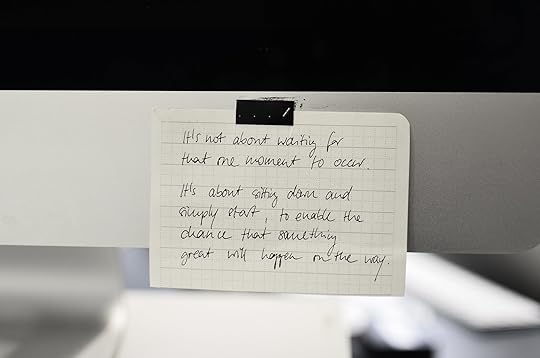 Photo by Skylar Kang on Pexels.com
Photo by Skylar Kang on Pexels.comAs usual Mr C went through his errs and ahs as he once again forgot his examples of what he was trying to explain to us about Semi Colons and Colons.
He told us about how; when he was young he wanted to travel the world. So he went to Canada and bummed around for a while. When he came home, his father told him, he should settle down and do something useful, so he became a teacher.
He then handed out his normal collection of worksheets for us to work from. I set to work on the first one he had given us, but found it to be very confusing. We had to put in where the punctuation went. When he came to check mine, he told me, I had left out the capital letters.
“Oh,” I said a bit puzzled as he hadn’t explained exactly what he had wanted us to do.
“Sorry, I’ve given you all the wrong sheets,” he said with that now annoying smile of his. “It should have been this one.”
The next sheet had the explanation at the top of what he wanted us to do. This made it so much more easier for us.
Mrs 40’something asked if he was going to go back over what we had learnt already as she couldn’t remember what he had taught us. She said, she still couldn’t remember what a verb was.
Next we went on to learn about apostrophes.
I’m just glad I went out and brought a grammar book to work through on my own. I can’t wait until this Thursday evening to find out what we will learn next, or not, whatever the case maybe.
I’m hoping to finish my short story, which Mr C said he’ll work through with me to correct any mistake I might have made with my grammar. I will post his comments on here if he does.
 Photo by Kat Jayne on Pexels.com
Photo by Kat Jayne on Pexels.comI do hope you are all managing to keep up with my adventures as a mature student. Today while searching through my folders looking for something else I came across some of Mr C’s worksheets 
 . On reading them, I still don’t find them very helpful.
. On reading them, I still don’t find them very helpful.

